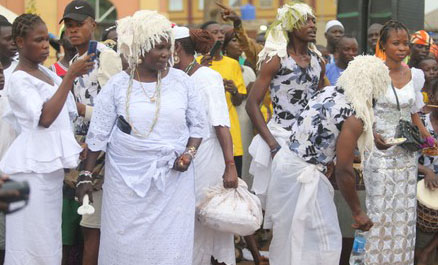By Alade Rotimi-John
Traditional religion practitioners attend the Isese day annual festival in Otta town, near Lagos, Nigeria, 20 August 2021.Photo by AKINTUNDE AKINLEYE/EPA-EFE/Shutterstock (12345760d)</p>
It will appear that the accustomed ethical and philosophical temper of the adherents of Islam and Christianity in Nigeria is tempestuously conjured or invoked on a scale of values and referent that is derisive, contemptuous of and indignant to indigenous African religion and its practices.
The cosmic framework regarding man’s sojourn on earth which is common to all religions without exception and whose underlying rationale is couched in myths and metaphysics is ignorantly explained away with regard to African traditional religion as being too matrixed in culture or in practices and traditions that are “ repugnant to natural justice, equity and good conscience”.
Even as religion is a reflection of the cultural understanding of the supernatural, African indigenous religion, in the poor or befuddled estimation of puritanical Muslims or muscular Christians, falls far below the benchmark for assessing or adjudging a religion. But the grim realities of the neo-colonial bearing of foreign religions are boldly etched in the decay and sludge we see all around us. There is so much decline in the salutary values of our pristine culture fostered, in the main, by our neo-colonial experience of which Islam and Christianity are its wind horse.
A certain disconcerting development involving a grinding autocracy or mindless attempts to openly abuse the cherished constitutional guarantee of freedom of worship and its attendant fallouts namely, freedom to hold ideas or opinions or to congregate is threatening to keep peace and tranquility at bay in an erstwhile socially-ambient environment.
Neo-feudalists in the bureaucracies and in the police system are confounding the rest of us with an inexplicable spread of mediocrity and confusion. They have taken it upon themselves the prerogative how or where we should worship or celebrate the affirmation of our self-apprehended cognition respecting our faith. Reactionary terror or violence is being offered or employed in the service of the evasion of state responsibility.
Thankfully, the Governors of Lagos, Ogun, Oyo and Osun states have saved us from a knawing cultural embarrassment by their patriotic action of recognising the existence or coefficient importance of our pantheon of faiths. They have elicited from our mythology and folklore, the Yoruba aphorism rendered in infinite wisdom as “Aparo kan ‘o ga ju kan lo”. All faiths are equal and none is more equal than the others. In the absence yet or delayed proclamation of a Yoruba national day, the governors have declared 21st of August as public holiday in celebration of Isese Day.
The most meaningful or rational signification we can assign to Isese is that it is the mythical understanding and celebration of the essence of creation. Etymologically, Isese is the condensed form of “ L’ atete ko se” or in the beginning. It is positioned to celebrate all that God or Olodumare did at the beginning of time or at creation. Curiously, the basic written word or literature of all known faiths speak creatively of The Beginning. The Bible, for instance, opens with “In the beginning…”
As it is necessary for every faith to construct its own worldview, it is propitious for it to attempt to locate its place in the largely ambiguous poles of the alternately chaotic, orderly, rational and irrational expanse of space man has found himself in relation to a mythic beginning. It will therefore appear irreconcilable why some faith will want to disturb or otherwise annoy another over the celebration of what basically is a midpoint for all of them – the celebration of the manifold blessings of the Creator. Owo ki i f’owo l’orun is the loose equivalent of the English language epigram “ The sky is vast enough to accommodate or permit the flying artistry or rascality of all and every bird”
Ilorin, a sprawling metallurgical industrial complex in the old Oyo Empire, is today threatening to be a flash point of sectarian fanaticism or upbeat fundamentalism. Our sense of the place of Ilorin in our culture particularly regarding the early days of science and production technology is being sorely replaced with a disquieting spirit of wahabism or Islamic irredentism. A once materialist or ideologically anti-myth disposition manifesting itself in industrial production and in an unyielding work ethic is today the workshop or battleground for the enforcement of values that do not represent Ilorin denizens’ best autochthonous sensibilities.
The original indigenous people of Ilorin are mild in temperament and lacked the tendency to dominate. They are easily embarrassed by displays of muscular enforcement of rules and conventions even as they disciplined themselves stringently and bottled up their emotions. They may not accept your politics but the consciousness of their feelings ought to weigh heavily on their oppressor. They are reserve, considerate and lack aggressiveness. They are more dignified than most of their neighbours or guests. They are extraordinarily well-mannered. It is strange that these values have not had any civilising effect on Ilorin’s stranger population but are instead being torpedoed by a stealthy, insiduously- powerful onslaught.
Isese which ought to be a rallying point for all who believe in the celebration of the immanent creativity, omniscience or omnipotence of the Creator of the heavens and the earth has found a screwed or mischievous interpretation for one of the fundamental factors that promote human advancement. Liberty and progress being inseparable companion are not attainable without an unfettered atmosphere for the practice of the basic freedoms respecting worship, the holding ideas and the respect for cherished or ennobling ethos.
The law must take its course in Ilorin and elsewhere where there has been a threat – no matter how thinly veiled – to the fundamental objective of furthering a peaceable, happy and prosperous society. • Rotimi-John, a lawyer and commentator on public affairs, wrote vide lawgravitas@gmail.com

